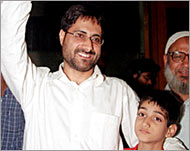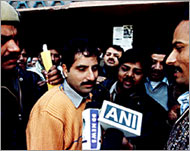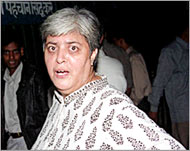In Delhi, Kashmiri Muslims lead uneasy lives
In sharp contrast to the bright and cosy creations of its earth and artisans, the people of Jammu and Kashmir seem dull and depressed. Especially those who travel from the conflict-torn state to the Indian capital Delhi for work and studies.

Shawl-sellers, carpet-weavers, fruit traders and students in Delhi from the only Muslim-majority state in India complain about daily victimisation at the hands of police and society. Neither wealth nor education, they say, provides immunity:
“Our Kashmiri Muslim identity is a curse,” says Rouf Shah, a 29-year-old graduate from Srinagar, who has a family business of hand-woven and embroidered woollens, and is currently selling his products at an elite exhibition venue, south Delhi’s Dilli Haat.
Referring to the 14-year-old conflict in his home state, Shah says, “A vast majority of Kashmiris are paying for the sins of a few, both in and outside the state.” And, the 13-month-old government of Mufti Muhammad Sayeed has done nothing to integrate separatist fighters into the mainstream, he says.
Healing touch
Shah dismisses the government’s healing touch policy as “a piece of rubbish”.
According to him, the story of victimisation begins as they step out of their homes in Kashmir. “But don’t ask me where it ends, every step is an ordeal.”
“We are frisked a dozen times from the entrance of Srinagar airport right up to the aircraft. In Delhi, the J and K (Jammu and Kashmir) number plate of my car is a problem as is my fair skin and beard. I cannot move alone after sundown because I may be picked up by the police on any pretext. I cannot move about with my young friends even in the day time here without inviting suspicious glares from cops and people,” he says.
Shah is well-off and lives in his own flat in Delhi but parking his car in the congested surroundings even for the night is a problem – because of the J and K number plate.
“Neighbours are wary and ask me to remove my car away from around their shops and residences.”
 |
|
Syed Abd al-Rahman Geelani after |
Shah has spent the last 16 winters in Delhi but it is only after taking over the family business that he felt the full impact of what it means to be a Kashmiri.
“The attitude of the local people towards Kashmiris is that of cops towards criminals. As a child I remember we were given great regard simply because we were Kashmiris; now, reactions are exactly the opposite.”
Shah is married but he would “never” bring his wife to Delhi. An encounter with the Delhi police on 13 December 2001- when the Indian Parliament House was attacked – has routed his faith in the system:
“I was stunned when cops came to my house at night because there was a terrorist attack in the city, but now I understand it better. Maybe they did not find anyone else to extract money from that night. I dread to think what would have happened had my wife been home.”
House ransacked
Shah says he was roughed up by drunk cops who were in his house for four hours, his servant was badly beaten and his house was ransacked. The search yielded nothing, but the cops extracted 2000 rupees ($40) from him.
Why didn’t he lodge a complaint?
“It would take a madcap to approach the very people who are victimising us for protection,” he says referring to the Delhi Police.
Abdul Rashid, 36 and Manzoor Ahmad, 34, who come to Delhi every winter to sell fruits in north Delhi’s wholesale fruit market at Azadpur confirm Shah’s opinion about the police:
“The atmosphere is so vicious that no matter what happens, we would never approach the police. That would only mean more trouble.”
Rashid and Ahmad are both owner-drivers of their trucks who travel 8000 km, making several trips from Srinagar to Delhi every season. However, they are scared to move even a few kilometres away from the Azadpur market. “We spend our days in and around the market and we sleep in our trucks.”
“Checking into hotels is a big headache because the owners demand a lot of identification papers and going to far off markets is a real risk because the police can pick us for questioning any time,” they say.
Their voter identity cards, issued by the Election Commission of India, they say, are their “only security outside Kashmir.” “It is like a passport for us. Catch us dead without it.”
At least 1200 Kashmiri fruit-traders move in and out of Delhi every day during the peak season from October to February. Those like 20-year-old Muhammad Ashraf Mir, who have just started working, say they would not dare to come to Delhi during off season or alone.
Mir’s very first visit to Delhi last year was a “nightmare”.
Extract money
On the night of Dussehra, a popular Hindu festival, Mir was in a hotel room along with a friend. “The police came out of the blue and started questioning me. Why I came to Delhi and when I would go back. They also asked me to stay put in the hotel room.”
The first thing Mir did after going back was to acquire a voter identity card. “Now that I have my card I feel safe. Also, during the season 20% of us in the market are Kashmiris. That too gives me a sense of security.”
 |
|
Ifthikar Gilani was in jail on |
The cop who came to question Mir did not extract any money from him, but the well-off Kashmiris have got used to bribing their way “all along the way from Srinagar to Delhi and back.”
“Extraction is anyway a big business with Delhi cops but they must be earning so much more from us Kashmiris,” says Shah.
Says Ifthikar Gilani, the bureau chief of a Srinagar-based popular English daily, Kashmir Times: “We used to receive almost daily complaints of harassment and extraction from ordinary people and forwarded them to the police, both in Delhi and Srinagar, bringing relief to quite a few people but I don’t recall any cop having been punished for the crime of harassing innocent people or for extracting money out of them.”
Official records about such cases in the Indian capital draw a blank. “Either there is no problem of the kind mentioned by you or there is no complaint,” said a police spokesman, wishing anonymity. He was also unaware of a report brought out by a respected human rights group, People’s Union of Democratic Rights.
Shadow of Fear
The report titled “Shadow of Fear- Harassment of Kashmiri Muslims in Delhi” was published in February 2002 but has not evoked any response from the state or central government, according to a spokesman. “The situation is far worse now than when we investigated such cases,” he says.
The report talks about Kashmiri Muslims being rounded up and confined to the police station, their homes and hotels on religious festivals, Independence and Republic days, and the hostile public attitude. “Denial of rented accommodation and Kashmiri hawkers not being allowed even to enter residential colonies to sell their goods without passes from the local police are among the several reflections of social hostility,” according to the report.
Ironically, even a journalist like Ifthikar Gilani became a police target. He was incarcerated for eight months on a framed-up case under the Prevention of Terrorism Act (POTA).
“I was targeted not only because I am a Kashmiri but also because of my father-in-law’s politics.” Gilani is married to the daughter of Syed Shah Gilani, an All Party Hurriyat Conference leader. The government implicated him to “discredit” his father-in-law, he says.
Gilani was accused of treason because he downloaded information on the deployment of Indian troops along the border from a Pakistan-based web site – information that is open to every net user. The government withdrew the case against him after the Indian military intelligence gave him a clean chit in court.
 |
|
Lawyer Nandita Haksar played a |
Gilani says the months he spent in Tihar were a “nightmare” but considers himself lucky compared to the “other Kashmiris languishing in jail on trumped-up cases”.
Gilani’s employers spent $2500 on legal help and gave financial support to his family while he was in jail.
“ I had the support of the entire media but they have no one to speak for them. You cannot even imagine their helplessness,” he says.
Hauled up
Babar Mohsin, 27, was a student in Delhi’s Jamia Milia when he ran into two strangers around the campus asking for directions to a property dealer’s office. Like a good Samaritan he gave them a lift to the office and never saw them before or after, but he was hauled up because the two were later found to have been involved in a POTA case – fake or real, he does not know.
The property dealer to whom Mohsin took the strangers, a Hindu, was also arrested but let off on bail. “Mohsin, plucked out of his college one fine day, has been in Tihar’s high security for nearly four years under a dreadful law for a crime he never committed. His mental state is beyond words,” says Gilani.
Syed Abd al-Rehman Gilani, the Delhi university teacher, who spent 22 months in jail until his acquittal by the Delhi High Court in the Parliament House terrorist attack, says “there are more than a 100 Kashmiri Muslims in Tihar, mostly arrested in false cases.”
The lecturer, like the journalist Gilani, received massive support from his fraternity and human rights groups but is anxious for the others he met in Tihar:
“I am determined to do something for them; It’s a call of duty but I have to get my own life in order first,” says Gilani who came out of jail in early November.
His lawyer and human rights activist Nandita Haksar, who played a key role in his legal battle, throws up her hands when asked whether help is on the way for the others: “Battling for Gilani’s freedom has been bad enough.”
Action plan
According to eminent social scientist Rajni Kothari, who was also chairman of a committee set up in support of Gilani, individual members may have an action plan for the others but the committee’s job is over.
|
“I am determined to do something for them; it’s a call of duty but I have to get my own life in order first” Syed Abd al-Rehman Gilani, |
G A Makroo, 70, who has a shop in New Delhi’s well-known shoppers’ lane, Janpath, says well established and old people like him do not face any harassment. Makroo has been in Delhi for 33 years.
“If you are straight and regular, they (the police) can’t harass you beyond a point.” But then Makroo confesses that he has not heard of the stories of those hundreds who are languishing in jail many without being formally booked and some under POTA for crimes they did not commit.
Makroo also agrees that in the “present atmosphere” no Kashmiri can afford to “commit the slightest illegality without it being blown out of proportion.” He advises young Kashmiris to keep to the straight and narrow path to stay out of harm’s way.
Apart from the floating population of Kashmiris in Delhi, there are 3000 Muslim families officially registered as migrants, but the actual number is much more. According to the state information department, the government would not disclose the identity of these people for their “own safety.” Their property can become easy target for take over by separatists.
So, back home it is bullets and bombs of separatists that worry the Kashmiris and, in Delhi, the fear of indiscriminate arrests and social jibes. “In Kashmir we die only once, in Delhi many times over,” is how Shah describes the plight of his people.
With everyone from cops to car-parking boys, employers, public call office owners, shopkeepers and neighbours treating the Kashmiri Muslims like anti-nationals, it is difficult to disagree with Shah’s philosophical analysis.
And those who can do something to stem the growing sense of alienation of these people seem blissfully unaware of what it means to be a Kashmiri Muslim in the Indian capital – a big punishment for no crime.